[Dec 2007, Volume 4 Quarterly Issue] Pdf File size - The IIPM Think ...
[Dec 2007, Volume 4 Quarterly Issue] Pdf File size - The IIPM Think ...
[Dec 2007, Volume 4 Quarterly Issue] Pdf File size - The IIPM Think ...
You also want an ePaper? Increase the reach of your titles
YUMPU automatically turns print PDFs into web optimized ePapers that Google loves.
MORE MARKETS, LESS GOVERNMENT<br />
the market price turns out to be higher<br />
than what poorer applicants can bear? If<br />
the government means to help, sellers<br />
can be required to sell at lower price to<br />
some applicants and get the difference<br />
reimbursed by the government. Sellers<br />
will be required to verify an applicant’s<br />
claim to the subsidy as per guideline.<br />
What is the incentive of a seller to do the<br />
extra work rather than pass on to the next<br />
applicant? If a seller is not keen to service<br />
these applicants it will simply lose<br />
some business. Poorer buyers will move<br />
to other sellers.<br />
What do we gain by upsetting the<br />
present system? First, as I suggested<br />
above, is to reduce the space for rentseeking.<br />
It not only reduces the burden<br />
of bribes in an ordinary household’s<br />
budget, but cleans the environment of<br />
governance. As rent-seeking abates, the<br />
grip of politics on service provision too<br />
falls to that extent. <strong>The</strong> effect on political<br />
life can be easily appreciated. Second,<br />
resource spent on providing this<br />
item will come down close to what is necessary<br />
with present technology of provision<br />
and verification. This gain actually<br />
means saving of resources, which should<br />
be earmarked for supporting loss of government<br />
job and hardship. Private firms<br />
are also expected to innovate processes<br />
in order to increase profit margin. This<br />
would bring in improvement in speed<br />
and quality for service users.<br />
Universal Services Or Public<br />
Goods<br />
Services that are public goods by nature<br />
are thought to be an area where markets<br />
would fail to produce the right amount<br />
at the right cost even if markets are competitive<br />
to the hilt. Because people can<br />
not be excluded from such a service once<br />
it is produced, it is difficult to get them<br />
pay the right price -- that is price commensurate<br />
with the benefit. Knowing<br />
that the service is going to be available<br />
any way, no one would be too keen to pay<br />
the deserving price, however much someone<br />
needs it. If such a service were to be<br />
produced by private sellers, they would<br />
find much less than the true demand in<br />
the market. Production will be less than<br />
requirement. Because there is no way of<br />
getting the right price paid, these services<br />
are usually funded from taxes.<br />
However many services that are traditionally<br />
known as public goods have<br />
ceased to be really so. We now have technology<br />
to prevent using many of these<br />
services even when they are available to<br />
others. Toll gates at the ends of a bridge<br />
are now common. We also have toll gates<br />
at the end of newly-built highways. In<br />
many countries gates are operated electronically<br />
to prevent users from skipping<br />
the toll and employees from stealing toll<br />
money. We have the technology to separate<br />
payers and non-payers in much more<br />
complicated situation than the bridge or<br />
the highway example. In London any vehicle<br />
entering the central business district<br />
with many entry and exit points is<br />
automatically billed for entry in working<br />
hours. This is done without obstructing<br />
traffic flow. As soon as we have a lowcost<br />
way to exclude non-payers, the service<br />
becomes like a private good and we<br />
could be better off by delegating them to<br />
market operation. Several state governments<br />
have invited private firms to build<br />
roads and bridges and collect tolls for a<br />
stipulated number of years. A common<br />
uneasiness about marketisation of these<br />
services comes from the belief that tolls<br />
or similar fees are an encroachment on<br />
our private budgets. “Why should we pay<br />
for using roads and bridges at all?”—it is<br />
asked. <strong>The</strong> fact of the matter is that we<br />
pay and have always paid for similar services<br />
through taxes. Paying a road charge<br />
at the toll gate is definitely fairer than<br />
that because those who do not use a road<br />
do not have to pay.<br />
Much of this is happening in India as I<br />
remarked earlier. <strong>The</strong> point here is that<br />
this model can be extended over a larger<br />
variety of government services. Maintenance<br />
of public places, government offices<br />
and buildings, railway stations and<br />
property, tourist routes and spots, places<br />
Majority of the services that are traditionally known as<br />
public goods have ceased to be really so. We now have<br />
technology to prevent using many of these services<br />
even when they are available to others<br />
of historical interest and so on can be<br />
brought under this mode of operation.<br />
<strong>The</strong> basic toll-gate model of business of<br />
course requires adaptation depending on<br />
the service. Several imaginative improvisations<br />
are already in use in various<br />
countries. For example, in some instances<br />
the government may not want to<br />
charge individuals though it is possible.<br />
<strong>The</strong> government may decide to waive<br />
tolls along the road to a pilgrimage or<br />
not to charge visitors of historical and<br />
educational sites. In this case the government<br />
itself pays the bill to the business<br />
that produces the service. Users do ‘buy’<br />
THE INDIA ECONOMY REVIEW<br />
39


![[Dec 2007, Volume 4 Quarterly Issue] Pdf File size - The IIPM Think ...](https://img.yumpu.com/29766298/38/500x640/dec-2007-volume-4-quarterly-issue-pdf-file-size-the-iipm-think-.jpg)
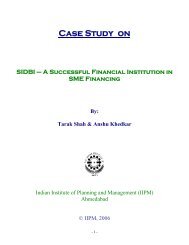
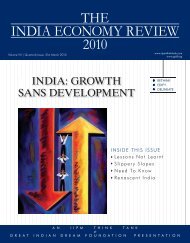
![[Feb 2008, Volume V Annual Issue] Pdf File size - The IIPM Think Tank](https://img.yumpu.com/43961117/1/190x245/feb-2008-volume-v-annual-issue-pdf-file-size-the-iipm-think-tank.jpg?quality=85)
![[June 2008, Volume V Quarterly Issue] Pdf File size - The IIPM Think ...](https://img.yumpu.com/41693247/1/190x245/june-2008-volume-v-quarterly-issue-pdf-file-size-the-iipm-think-.jpg?quality=85)

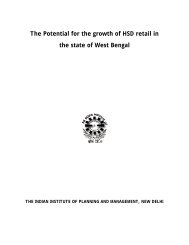
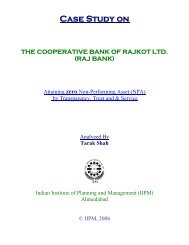
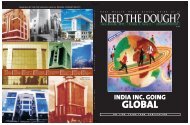
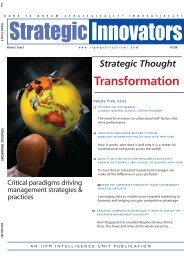
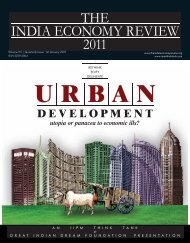

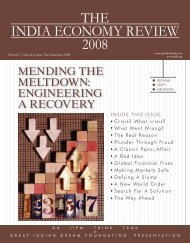
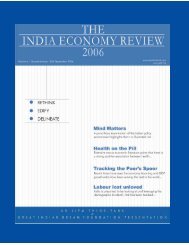
![[Volume VI | Quarterly Issue: 31st May 2009] Pdf File size](https://img.yumpu.com/27796051/1/190x245/volume-vi-quarterly-issue-31st-may-2009-pdf-file-size.jpg?quality=85)